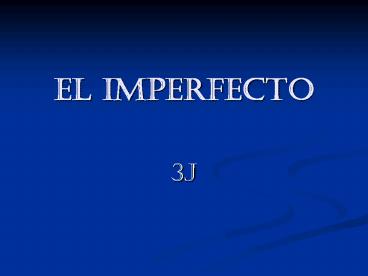EL IMPERFECTO PowerPoint PPT Presentation
1 / 13
Title: EL IMPERFECTO
1
EL IMPERFECTO
- 3J
2
EL IMPERFECTO
- The imperfect is used for past actions that are
not seen as completed. Use of the imperfect tense
implies that the past action did not have a
definite beginning or a definite end. - Forms of the imperfect, regular verbs.
- Stem Take the infinitive, and remove the last
two letters (the infinitive ending)
hablar gt habl- comer gt com- vivir gt viv-. - Endings -ar verbs -aba, -abas, -aba, -ábamos,
-abais, -aban. -er and -ir verbs
-ía, -ías, -ía, -íamos, -íais, -ían.
3
EL IMPERFECTO
- HABLAR COMER VIVIR
- Hablaba hablábamos comía comíamos vivía
vivíamos - Hablabas hablabais comías comíais vivías
vivíais - Hablaba hablaban comía comían vivía
vivían
4
EL IMPERFECTO
- Irregular verbs. Only three verbs are irregular
in the imperfect ser, ir, and ver - Ser ir ver
- Era éramos iba íbamos veía veíamos
- Eras erais ibas ibais veías veíais
- Era eran niba iban veía veían
5
EL IMPERFECTO
- Meaning and usage. The imperfect is one of two
simple (that is, non-compound) past tenses in
the indicative. It is used - A. To indicate an action or state viewed as being
in progress in the past. - Yo cantaba mi canción favorita. I was singing my
favorite song. - Estábamos muy cansados.We were (feeling) very
tired.
6
EL IMPERFECTO
- B. To indicate a customary or repeated action or
state in the past. - Cada domingo íbamos al parque. Every Sunday we
used to go to the park. - De vez en cuando me miraban.They would look at me
from time to time.
7
EL IMPERFECTO
- C. To indicate the time of day (and ordinarily
the day of the week, date, etc.) when talking
about the past. Note that this is really a
sub-category of A above. - Eran las seis de la mañana. It was six o'clock
a.m. - Era lunes, el cinco de junio. It was Monday, June
5th.
8
EL IMPERFECTO
- D. To give descriptions in the past or paint the
background (the imperfect sets the stage on which
another action typically given in the preterit
was performed). Note that this is really another
sub-category of A above. - Ella tenía hambre, y no había nada en la
refrigeradora. She was hungry, and there was
nothing in the refrigerator. - (Por eso fue a comprar algo.) (So she went
preterite to buy something.)
9
EL IMPERFECTO
- Special usage hacer with expressions of time.
- To indicate an action which started in (prior)
past time and which is viewed as still continuing
in past time, the imperfect is used. In English
this is often expressed with for plus a period
of time, with the verb in the past perfect
progressive.
10
EL IMPERFECTO
- Hacía tres horas que trabajaba I had been
working for three hours - (cuando algo extraño pasó). (when something
strange happened). - or
- Trabajaba desde hacía tres horasI had been
working for three hours (cuando algo extraño
pasó). (when something strange happened).
11
EL IMPERFECTO
- Notes
- In these expressions of time, you can use hacía
... que before the verb, or desde hacía after the
verb, as shown in two examples given above. - The imperfect tense is basically the present
tense backshifted to past time remember that the
present tense not the present perfect is used
to indicate an action begun in simple past time
and continuing on into the present
12
EL IMPERFECTO
- Hace tres horas que trabajo. I have been
working for three hours.To ask How long had
(something been happening), use Cuánto tiempo
hacía que... - Cuánto tiempo hacía que usted viajaba por
México? How long had you been traveling around
Mexico?
13
EL IMPERFECTO
- Alternate method. Instead of using hacer, it is
also possible to use the verb llevar period of
time gerund. Llevar is likewise used in the
imperfect - Llevaba tres horas trabajando. I had been
working for three hours.Cuánto tiempo llevabas
viajando por México?How long had you been
traveling around Mexico?

